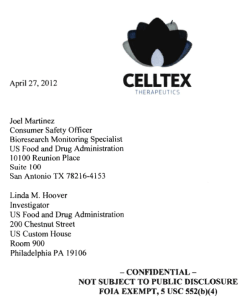In response to a FOIA request, the FDA informed me that they are continuing to investigate Texas stem cell clinic, Celltex.

The firm has been flying somewhat under the radar lately. They have not responded to multiple requests for comments on various issues.
The FDA indicated to me that what they can release in terms of documents is limited at this time because, to quote them, “The FDA inspection of CellTex is still open”. Note that the FDA refers to the company with an internal capital “T”.
The FDA did send me several previously not publicly available documents of interest related to the company.
It is also important to note that Celltex argued very strongly that these documents were exempt from FOIA (see bold text at the bottom of the image of their letter of April 27, 2012 to the FDA at above left).
Apparently the FDA disagreed as they released them.
This post is #1 of a series of blog pieces on this new information on Celltex.
By way of background, the Texas clinic firm has received quite a bit of media attention overall, especially for their role in the treatment of Texas Guv Rick Perry with stem cells for a back problem.
University of Minnesota professor Leigh Turner wrote a letter of concern to the FDA about Celltex. A few months later, Celltex was inspected by the FDA. I believe in part the investigation and inspection were sparked by Turner’s letter. Without Turner’s courageous action I hate to think where things might be in terms of the number of patients at risk.
In the inspection report (called a 483), the FDA defined Celltex as a “Biological Drug Manufacturer”, a designation that the company took strong issue with on several occasions.
Ultimately the FDA issued Celltex a warning letter, a relatively serious regulatory step that resulted in Celltex stopping clinically-related operations in Texas.
At some point after the warning letter, Celltex indicated it would move those transplant operations to Mexico, but it remains unknown if that transition has happened. In addition, if Celltex patients are being transplanted with stem cells, it is unclear how they are transporting the patient stem cells from Texas out of the US to Mexco.
Export of human commercial biological products such as stem cells is an extremely complex process involving tons of regulations and multiple agencies such as the FDA, CDC, and Customs. Former Celltex partner, RNL Bio, has run into serious issues related to cross-border transport of stem cells.
The new documents released by the FDA via the FOIA are revealing about Celltex’s perspectives and line of reasoning with the FDA. Stay tuned for more posts in this series.
Pingback: Saga of Texas Stem Cell Clinic Celltex Continues | Knoepfler Lab Stem Cell Blog
Pingback: Celltex FDA FOIA Letter #3 Raises Key New Questions | Knoepfler Lab Stem Cell Blog
Pingback: Celltex FDA FOIA letter #2: no safety concerns with our stem cells, which really are not drugs | Knoepfler Lab Stem Cell Blog
Pingback: Celltex advocate Rick Perry will not run again for Texas governor: stem cell impact | Knoepfler Lab Stem Cell Blog
Pingback: Celltex letters to the FDA revealed by FOIA: first is reaction to Leigh Turner | Knoepfler Lab Stem Cell Blog
Leigh Turner’s heroic efforts to illuminate the improprieties and danger of Celltex and others, along with your continuing efforts to renew and expand this information when necessary, are at the very top of all of our efforts to illuminate those who would otherwise be prey for the mercenaries.
Mercenaries!?!?
Might be difficult to find a doc that doesn’t expect a fiscal return for his labour…. Stem cell scientists and professors also?
The issues are safety and efficacy and a realistic weighing of benefit and risk — for specific therapies administered by people with specific training. Show me the meat.
Not trying to pick a nit, but mercenaries are “motivated solely by a desire for monetary or material gain”. That definition, pretty well accepted, doesn’t take into account your well-stated issues of “safety, efficacy and a realistic weighing of benefit and risk…”. If Celltex, Precision StemCell and others written about by Dr Turner and others took those factors into account, I wouldn’t refer to them as mercenaries.
Stephen,I’m not sure I understand your point about mercenaries as it relates to stem cell for-profits that may be on the edge of non-compliance?
Pingback: Blog – FDA still investigating Celltex (Knoepfler Lab Stem Cell Blog) | Stu's Stem Cell Blog